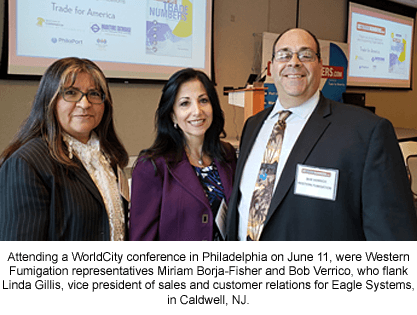Western Fumigation a Key Player in AQI Task Force
BY TAD THOMPSON | JULY 26, 2019
PHILADELPHIA — For more than 40 years, Lester, PA-based Western Fumigation has been actively involved in enhancing the business climate for the ports of the Delaware River.
Currently, some of Western’s key work involves dialogue with USDA-APHIS, according to Kurt Reichert, fumigation director.

Since USDA first announced new Agriculture Quarantine Inspection (AQI) treatment fees, Western has championed equitable implementation for clients of the Delaware River ports, according to a statement shared by Western with The Produce News.
Western Fumigation is part of the task force led by the Maritime Exchange for the Delaware River and Bay, which, among many other projects, works directly with USDA on the AQI fees.
The AQI task force represents stakeholders from both the Delaware River and the West Coast.
In December 2015, AQI increased APHIS agents’ overtime charges for fumigation and cold treatment supervision.
“Western is sensitive to the burden that the increasing cost of AQI treatment fees is having on our customers,” Reichert noted. “Since the fruit fumigations in the Ports of Philadelphia began in the 1980s, we have steadily developed methods to increase efficiencies in the fumigation process. We are able to have each USDA officer supervise up to 2,400 pallets for fumigation, whereas at some other ports, they can only manage 200 pallets per officer. This makes very efficient use of the USDA’s billable time and saves our customers time and money.”
Reichert added, “If there are additional service cost reductions to be realized within the USDA, they must come from the USDA. The AQI treatment fees cover costs in the program that are not part of the actual fumigation process. There are training, research, and administrative costs rolled into the program which Western and our customers have no control over. We should not be seen as a blank check to cover every cost while having no say in what costs go into the program.”
Western Fumigation indicates that “some southern stakeholders have begun to push for a more direct way to control the rising costs of USDA treatments by proposing that USDA officers need not physically be present for the treatments, instead, monitoring them remotely and allowing fewer officers to oversee more treatments. APHIS has agreed to look at greater efficiencies internally and will share updates with industry as progress is made.”
While ports in the southern United States are competing for Philadelphia’s business, “We not only have proximity to the market, but the expertise is here for service providers. We are going into our fifth decade now in serving the international produce industry. There is a reason people choose to come here,” said Miriam Borja-Fisher, senior business development manager of Western Fumigation.
She noted that cargo arriving in Philadelphia can access two-thirds of the U.S. population in one or two days.
Key Canadian markets can also be reached by truck in the same amount of time.
Borja-Fisher is engaged in several associations, including the Chilean & American Chamber of Commerce of Greater Philadelphia, the World Trade Association of Philadelphia, and Ship Philly First.
Reichert serves on three key committees affecting port security, operations, and worker safety.
“Being deeply involved in the ports gives us the opportunity to learn how to serve our clients in more meaningful ways. Making a contribution has always been indicative of our corporate culture,” Borja-Fisher said.